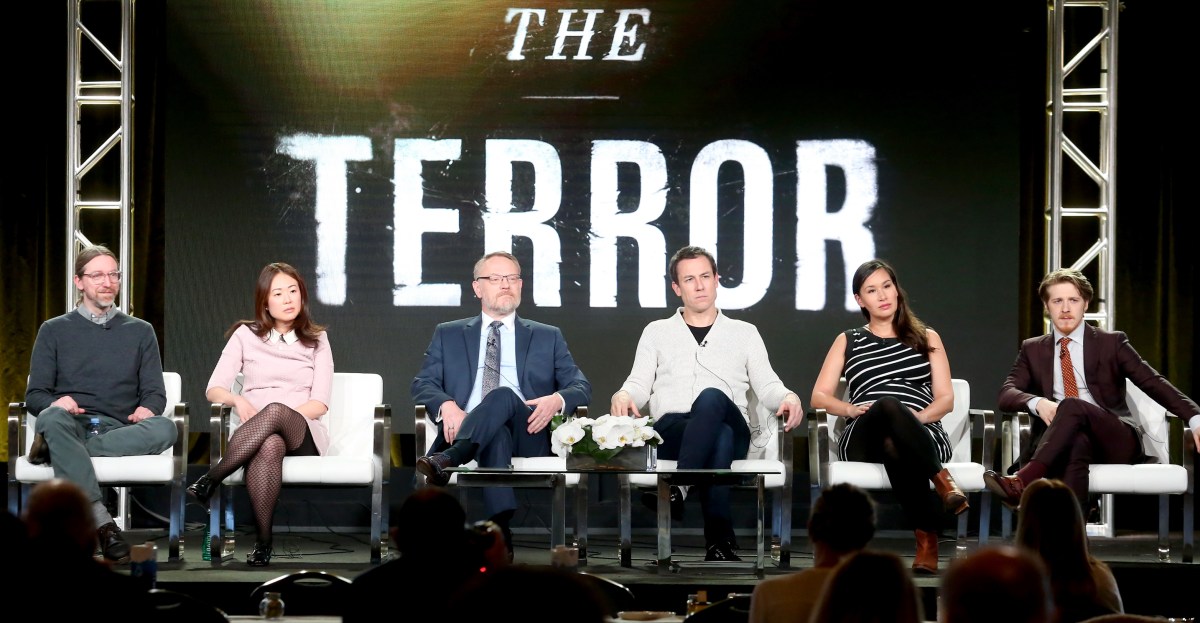All is well at Terror Camp.
The author Julian Sancton has just finished speaking about his book Madhouse at the End of the Earth, which documents the ill-equipped and ill-fated Belgian Antarctic expedition of 1897. The conference attendees are watching via Zoom, and flooding the accompanying Discord chat with hearts and hand-clap emojis when Allegra Rosenberg, the event’s organizer, reminds everyone to stay on for a special announcement — and, apparently, a special guest.
Another person joins the Zoom call. It’s David Kajganich, a writer and producer of the 2018 TV series The Terror about the even worse-fated 1845 Franklin expedition in the Arctic — the show that is the reason over 1,800 people have signed up for the digital conference in early December.
Kajganich has a simple but exciting announcement: He’s finally releasing a set of Spotify playlists for the lost men of the Franklin expedition. Initially, Kajganich had planned to release the playlists in the fall, but he was waylaid by something peculiar: the identification of the remains of James Fitzjames, one of the expedition’s three captains.
The skeleton was first found in the 1990s, but a massive effort was recently made to collect DNA evidence of direct descendants of the Franklin expedition’s crew, which enabled the remains to be identified. But knife marks on the skeleton’s mandible also confirmed that Fitzjames’ body had been cannibalized.
Not the mood in which a thoughtful show creator wants to jump in with a fun, frothy Spotify project.
So Kajganich waited. Now, each week, he’s releasing a playlist for each character, curated to include songs that Kajganich believes they would listen to if they lived in the present day.
(“Edward Little Radiohead,” a viewer immediately quips in the chat — referring to the lieutenant portrayed by Matthew McNulty with the countenance of a wet and chronically depressed sheepdog.)
Kajganich cautions the excited crowd that he didn’t think about lyrics at all when he was making the playlists. “Please — as many of you are sort of wont to do — do not exhaust yourself looking for coded messages in the lyrics, or connective tissue with events of the show. I’ve gone out of my way to not think too much about that.”
The advice is reasonable. But reveling in the pleasure of thinking is exactly why everyone is here, at a conference built around one season of a television show that aired in 2018.
The Terror is an adaptation of the Dan Simmons novel of the same name. It spins a fictionalized tale of the Franklin expedition, a real-life endeavor to find the Northwest Passage that set sail in 1845.
In our world, the Franklin expedition disappeared. The first rescue mission was sent in 1848. Subsequent attempts to find the missing men would map more of the Arctic than the Franklin expedition itself ever saw. But the men were long dead — explorers found only bodies.
In the show, the men are beset by supernatural terrors as well as the grim realities of scurvy, starvation, and cold. It could have been miserable. It could have been misanthropic. Instead, The Terror is a thoughtful, nuanced look at what happens when men are lost where they don’t belong, and set adrift from the restrictive norms that defined Victorian England. Who thrives? Who breaks down? Who survives?
Kajganich and fellow creator Soo Hugh took a cast of predominantly white (and bearded, and mutton-chopped) men, and used them as a canvas to tell a story that captures viewers’ imaginations even six years later.
According to Fandom’s 2024 Year in Review, the show has shot onto the top 100 list of most-talked-about TV shows on Tumblr. It’s No. 63. This is certainly due in part to the show finally coming to Netflix in August. But excited new viewers are being welcomed open-armed by a community that’s been going strong since 2018 — and Terror Camp is its biggest party.
Terror Camp, which has been run annually since 2021, bills itself as a fan convention and academic conference. It is absolutely, rigorously both.
“It’s like this thing that originally came out of Terror fandom,” says Sarah Pickman, one of this year’s organizers. “But has grown to encompass some people who are in academia, some people who aren’t, all people who are just united by this amazing love for this history and really thinking deeply about how the Arctic and Antarctica are represented in media, including in The Terror, which just gives you so much to analyze.”
“I’m used to online fandoms but not academic conferences, so I was initially intimidated by the idea of Terror Camp,” says Goz, a Terror fan who has been attending the conference since its second iteration in 2022. Over Discord, she wrote to me that she overcame the nerves because that year’s programming featured interviews with two of the actors and a writer, as well as the show’s costume designer — and like many fans, she was curious about what it was like behind the scenes.
The surprise, then, was being thrust into the wide, cold world of polar exploration, and the warm embrace of the fandom. “I got to react to and discuss the presentations with other attendees in real time,” Goz wrote. “I didn’t feel like I was out of my depth, but rather an enthusiast among other enthusiasts, even for the presentation topics I was just learning about for the first time.”
Pickman is one of the fans who came to the show from academia. She was pursuing her doctorate in Yale University’s History of Science and Medicine Program when she first watched it in 2018.
But The Terror has also pushed everyday TV fans to cast themselves as researchers. Pickman tells me this is not atypical for polar history. The field, more so than many others, attracts people from non-academic backgrounds.
She points to David C. Woodman’s book Unravelling the Franklin Mystery: Inuit Testimony. The book compiles Inuit histories of the Franklin expedition – testimonies that were ignored by the British admiralty at the time and then neglected in the century since.
“And he wasn’t a professor. I mean, he was just a guy,” Pickman says. “I think he worked for the Canadian military, but oh my God, he just spent so much time in the National Archives in Washington, D.C., reading handwritten 19th-century journals and correspondence and transcribing all of this evidence that everybody else had overlooked. And the book that he wrote has become a really serious book that everybody references.”
Many of Terror Camp’s presenters do end up coming from the academic world — but all approach their topics with the enthusiasm and warmth of fans. It makes for a weekend of programming that’s really fun to watch.
We’re treated to a thorough and deeply sourced presentation from Ted Logun about The Frozen Deep, “a very bad play that everyone loved,” by Wilkie Collins and Charles Dickens. The 1856 play was one of Dickens’ many efforts to canonize the Franklin expedition as a heroic tragedy. When contemporary reports came in that the lost men had resorted to cannibalism, Dickens was one of the loudest voices refuting them. Dickens greatly exerted himself to ensure that Franklin, and by extention the colonial motivations of the expedition, were never called into question.
Logun caps the presentation off with a slide that reads “Fuck you, Mr. Dickens.”
During another panel, the chat absolutely pops off at the mention of John Sacheuse, an early 19th-century Inuk interpreter. He’s received with all the enthusiasm of an actor from the TV show.
“I think that’s one of the cool things about Terror Camp, is that there are various structures in academia and traditional academic conferences that can be gatekeeping mechanisms,” Pickman tells me. “This one is just like, if you’re interested, just show up. […] You don’t have to wait to try to break down the doors, to be part of a more traditional academic conversation.”
That sentiment is echoed by Goz. “This year, there were a number of sessions that highlighted marginalized voices in particular, like presentations on Inuit and female perspectives in polar exploration, on queerness in the context of the historical era or transness in the context of present-day fandom,” she says. “It shows that you don’t have to be an armchair dad obsessed with naval warfare to enjoy The Terror and its related subjects. You can be into fashion or food or gender, or just really curious about a single working-class historical figure who might otherwise have been remembered mostly as just another name on a muster roll.”
Terror Camp has expanded its focus in the four years it’s been running, but the TV show remains at the heart of many of the panels — and demonstrates why it’s such a powerful entry point into polar obsession.
One of the weekend’s presentations was by Leah Palmer, a Ph.D. student at the University of Galway whose focus is Arctic archival material. Palmer uses one of the show’s most beloved characters, the surgeon Harry Goodsir, as a springboard to discuss 19th-century Inuit-language dictionaries.
In The Terror, Goodsir is one of the few men who attempts to understand a captured Inuk woman, dubbed Lady Silence by the English crew. Working with Lady Silence, Goodsir begins compiling a simple one-to-one English-to-Inuktut dictionary.
Palmer tells an enthralled audience that there were many such dictionaries in circulation in the 19th century — and that many were created because of the search for the missing Franklin expedition. Dictionaries taught English sailors useful phrases such as “Have you seen any large ships lately?” and “Have you seen any white men on this coast?”
In a Q&A afterward, Palmer points out that these dictionaries weren’t always accurate. For example, James Clark Ross listed the word for nose as “Inuk.” In fact, in Inuktut, it’s simply the singular of Inuit. One imagines that whoever Ross was talking to pointed at their own face and Ross took it too literally — but it’s a breathtakingly huge error to confuse a person for a body part.
But such is the story of polar exploration. The field is full of stories where survival rested on the blade of a knife. A single bad decision or misunderstanding could spell doom. Pickman says this is part of why survival stories like The Terror resonate with modern viewers.
“Why do we have people in 2024 who are still obsessed with the Donner Party or the Raft of the Medusa?” Pickman asks rhetorically. “All these historical episodes, these extreme survival stories — what do people do in these kinds of circumstances? Who rises to the occasion? And how did the veneers of civilization and order break down? I think that’s really compelling, and it was done so well in the show.”
The Terror has been a niche enough show that Terror Camp has always been able to get talent to appear in the programming. Dave Kajganich actually did a keynote in the conference’s first year and showed eager fans some deleted scenes. This led to a funny moment in this year’s Saturday keynote, which for the first time featured the legendary actor Jared Harris (who has made TV audiences weep on Chernobyl and Mad Men, and will soon take a turn playing Claudius in Hamlet at the Royal Shakespeare Company), alongside his able scene partner Liam Garrigan.
The two play Captain Francis Crozier and his steward, Thomas Jopson, respectively. As Jopson, Garrigan balances both steely darkness and loyalty. In a show full of tragedy, Jopson’s particular fate is one of the most striking, and coupled with Garrigan’s portrayal, it’s made him a fan favorite. (Although it could be argued that, given how dedicated people are to this show, every character with at least two seconds of screentime is someone’s favorite.)
Garrigan describes one of the deleted scenes that he filmed, shot for shot, from memory. He’s clearly excited about it, he remembers it being brilliant on the page, but isn’t sure how it turned out. Apparently, he’s never actually seen it — but many of the fans have, thanks to Terror Camp. The panel’s moderator promises to send it to him.
“I’m sure Dave wouldn’t mind.”
To me, Terror Camp is the utopian vision of what fandom should be. A lot of people hear “fandom” and cringe, imagining an uncritical, single-minded devotion to a celebrity, or show, or what have you. But we’re not talking stan wars on X, here.
What Terror Camp shows is that fandom can be about learning a lot of cool shit and sharing it with people. It’s a conference that somehow balances extremely valid criticism of the polar projects and their colonial goals with empathy for the people involved and an appreciation of all the themes that grow out of polar narratives.
But mostly, I just like it when smart, funny people tell me things that I didn’t know before. And that’s what Terror Camp does so, so well.















Comments are closed